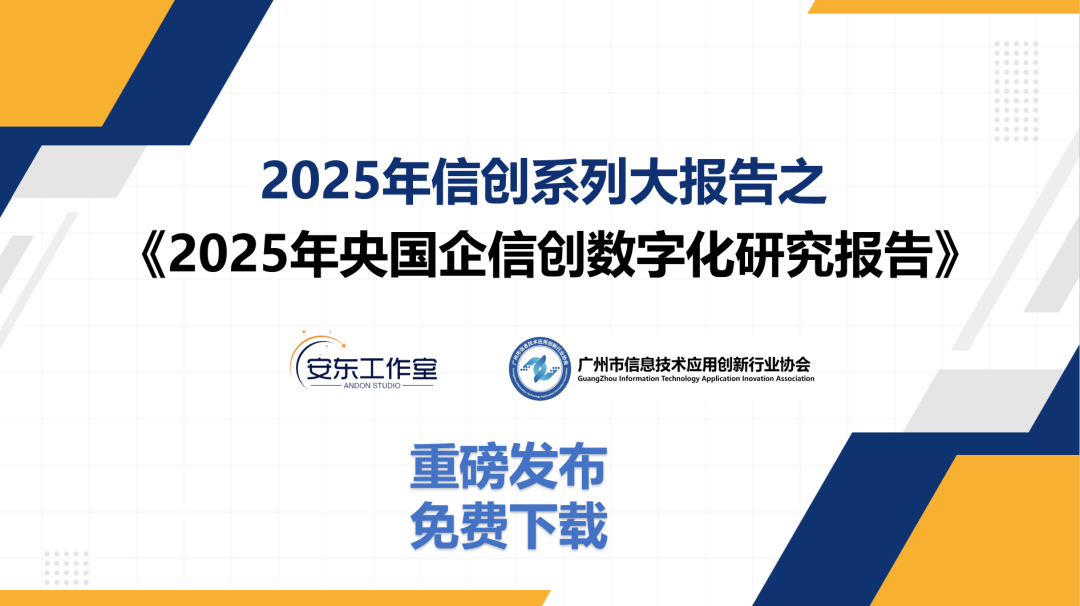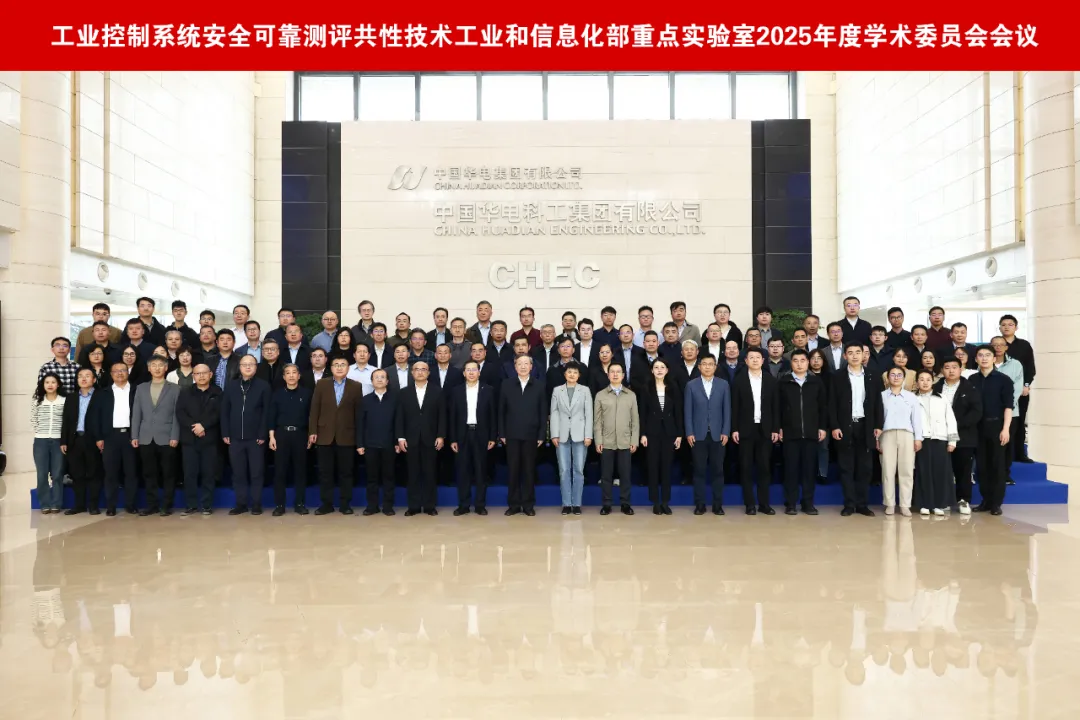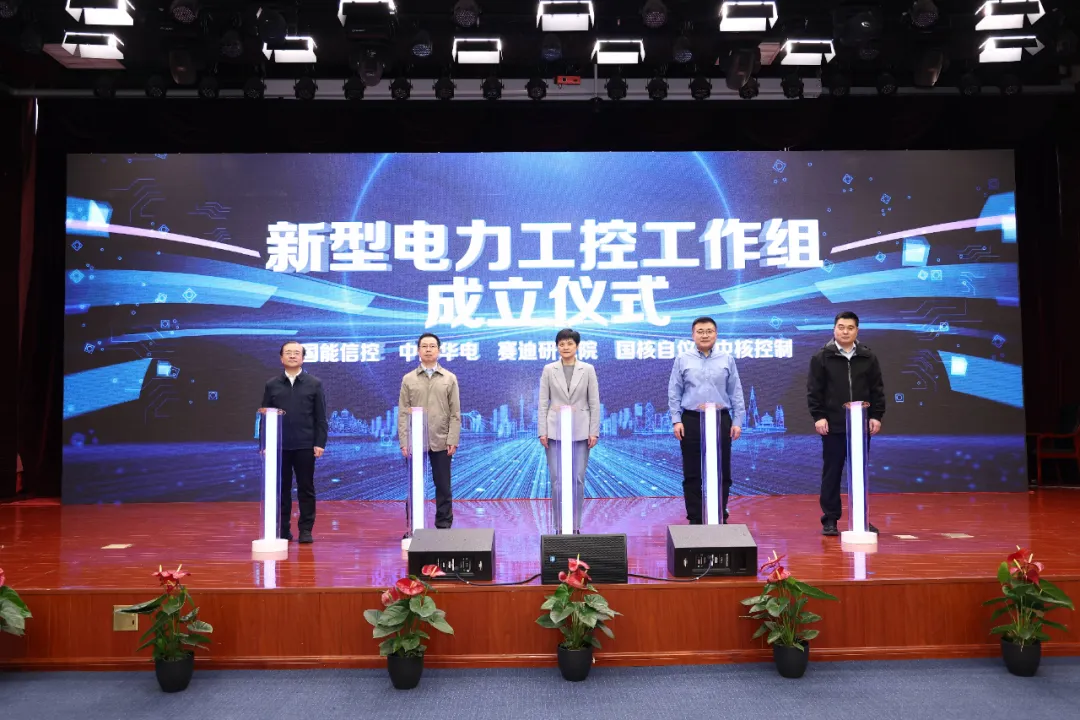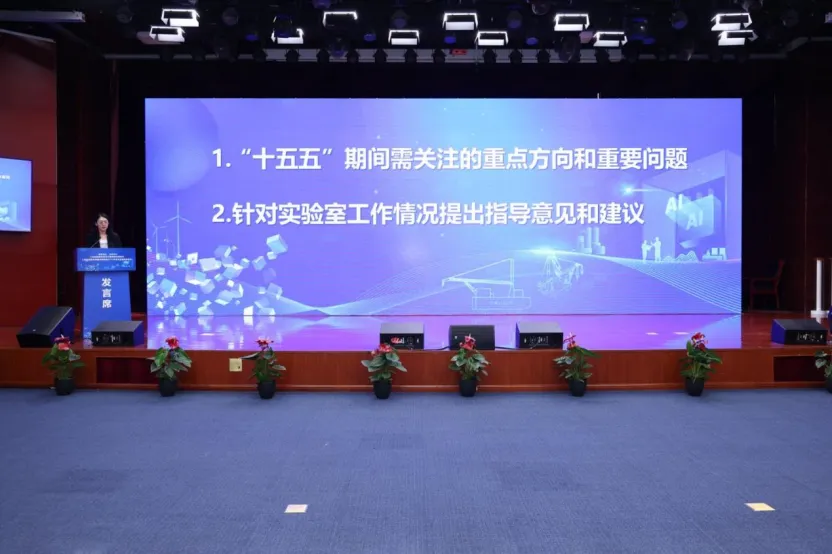Click Industrial Innovation and mark it as a star ⭐️ to get the latest news promptly

Editor’s Note: Recently, the 2025 annual academic committee meeting of the Key Laboratory for Common Technologies in Industrial Control System Security Assessment (hereinafter referred to as the “Key Laboratory”) was grandly held in Beijing. At the meeting, five organizations, including the China Center for Information Industry Development, China Huadian Corporation, Guokong Ziyuan, Guoneng Xinkong, and China Nuclear Control, jointly initiated the establishment of the “New Power Industrial Control Working Group.” This group aims to conduct significant key common and industrial common technology research for the power industry, promoting the formation of an industrial closed loop of “demand-technology-product-application,” jointly building a pilot verification environment for industrial operating systems, and creating a full-chain service system covering concept verification to industrialization.。
Editor | Industrial Innovation WeChat Official Account (ID: xinchuangzh)Produced by | Andong StudioAuthor | AndongReprint | Please indicate the source

Scan to join the “Industrial Innovation” knowledge community and obtain more information related to industrial innovation and digitalizationThe 2025 annual academic committee meeting of the Key Laboratory for Common Technologies in Industrial Control System Security Assessment was successfully held on March 26, 2025, at the Huadian Science and Technology Building. The meeting was jointly organized by China Huadian Science and Technology Group Co., Ltd. and the China Electronic Information Industry Development Research Institute, gathering many experts from academia and industry to discuss cutting-edge technologies and future development directions in the field of industrial control security.The academic committee director of the laboratory, Qian Feng, an academician of the Chinese Academy of Engineering, the laboratory director, Zhu Min, vice president of the China Electronic Information Industry Development Research Institute, Zhang Yulong, deputy director of the Science and Digitalization Department of China Huadian Group Co., Ltd., and Sun Linfu, chief professor at Southwest Jiaotong University and leader of the expert group for the national key R&D program “Industrial Software,” attended the meeting.
01
Main Content and Achievements of the Meeting
The meeting focused on the common technologies for the security and reliability assessment of industrial control systems, with a key discussion on the deep integration of new generation information technologies (such as artificial intelligence, industrial internet, etc.) with industrial control systems. As one of the first key laboratories in the field of industrial control established by the Ministry of Industry and Information Technology, the laboratory’s research direction focuses on enhancing the autonomous controllability and security protection levels of industrial control systems, supporting the construction of new industrialization.
According to publicly reported information from the meeting, the focus was on the integrated development of new power industrial control systems and industrial innovation, achieving the following key results:
Establishment of the New Power Industrial Control Working Group:
At the meeting, the China Center for Information Industry Development, China Huadian, Guokong Ziyuan, Guoneng Xinkong, and China Nuclear Control jointly initiated the establishment of the “New Power Industrial Control Working Group.” This group aims to conduct significant key common and industrial common technology research for the power industry, promoting the formation of an industrial closed loop of “demand-technology-product-application,” jointly building a pilot verification environment for industrial operating systems, and creating a full-chain service system covering concept verification to industrialization.

Planning of the Central Enterprise Innovation Consortium:
Jing Hailin, Secretary of the Party Committee and Chairman of Nanjing Automation Co., Ltd., reported on the work ideas and planning under the title “Planning the New Power Industrial Control System, Building a Central Enterprise Innovation Consortium,” emphasizing the need for cross-enterprise collaboration to integrate resources to tackle technical challenges and promote the autonomous controllability and intelligent development of power industrial control systems.
Integration of Artificial Intelligence and New Technologies:
The laboratory has clarified that it will deeply integrate new technologies such as artificial intelligence and industrial internet into innovative research, enhancing the intelligence level of industrial control system security assessment technologies while supporting the safety and reliability requirements in the construction of new power systems. Sun Linfu, chief professor at Southwest Jiaotong University and leader of the expert group for the national key R&D program “Industrial Software,” delivered a keynote report on “Innovation of Industrial Software and Digital Transformation of Industries,” providing a detailed interpretation of the systematic innovation development process of industrial software, proposing advanced production models based on industrial interconnection and industrial intelligence, and sharing typical application cases in key industries such as high-end nuclear medicine equipment.
The laboratory is one of the first key laboratories in the field of industrial control established by the Ministry of Industry and Information Technology, dedicated to the research and development of industrial control security technologies and standard formulation. For example, at the 2023 Third Industrial Control China Conference, the laboratory jointly unveiled the Suzhou base and promoted the innovation ecosystem construction of industrial operating systems. The convening of this 2025 meeting marks the laboratory’s continued role in leading technology under the new industrialization context, providing support for the safety and high-quality development of the industrial chain.

02
Analysis of the Relationship Between Industrial Control Security Assessment Laboratory and Industrial Innovation
The role of the Industrial Control Security Assessment Key Laboratory in Industrial Innovation
Assessment technology supports the implementation of industrial innovation: The laboratory focuses on the security and reliability assessment technology of industrial control systems, providing standard verification and safety assessment for domestically produced industrial control products (such as PLCs, industrial operating systems) to ensure compliance with the requirements for domestic substitution. For example, in 2023, the laboratory promoted the integration of commercial encryption with industrial control systems, strengthening the security baseline of domestic systems.
Promoting collaboration in the industrial innovation chain: Through open topics and industry-university-research cooperation, the laboratory assists in forming the industrial software industry chain in industrial innovation hubs such as Suzhou, where the Wuzhong District relies on the laboratory base to accelerate the application of industrial innovation products.
The relationship between industrial control system security and industrial innovation
Mutual promotion of technologies: Assessment technology serves as the “quality checkpoint” for industrial innovation, verifying the reliability of domestic systems through standardized testing; while the demand for industrial innovation drives the upgrade of assessment technologies, for example, to address complex security threats in AI integration scenarios.
Co-building the ecosystem: The laboratory collaborates with enterprises to formulate industrial control security standards, promoting the evolution of the domestic industrial control product ecosystem from “usable” to “easy to use.”
Interactions between artificial intelligence, new power industrial control systems, and industrial innovation
AI-driven innovation: AI technology empowers new power systems (such as intelligent inspection and dynamic scheduling in the Southern Power Grid), but its underlying algorithms and computing power must be based on domestic platforms to avoid “bottleneck” risks.
Industrial innovation ensures safety and controllability: Industrial innovation ensures the autonomous controllability of AI models and industrial operating systems through domestic substitution, while the laboratory’s assessment technology provides safety verification support for the integration of the two, forming a closed loop of “technological breakthrough—safety assessment—industrial innovation implementation”.
Example of synergistic effects: In the new power industrial control system, AI-optimized energy scheduling relies on domestically produced industrial software and hardware, while the industrial innovation ecosystem ensures its reliability through laboratory assessments, ultimately achieving an efficient and safe intelligent transformation of the power system.
03
Predictions for Future Work Focus in Industrial Innovation
At the recent academic committee meeting, Yang Xuezhi, executive deputy director of the laboratory and general manager of the Industrial Control System Research and Assessment Division of the China Electronic Information Industry Development Research Institute, presented the “2024 Annual Work Report of the Laboratory and the 2025 Work Plan,” while Yu Kang, chairman of Guoneng Xinkong Technology Co., Ltd., presented the “Joint Laboratory Work Report for the Wind Power Industry,” and Zhou Haixiang, general manager of Guokong Ziyuan System Engineering Company, presented the “Joint Laboratory Work Report for the Nuclear Energy Industry.” This indicates that the common technologies for the security and reliability assessment of industrial control systems are being practically explored in related laboratories in multiple energy application scenarios such as wind power and nuclear energy.
 Although publicly reported information has not seen the laboratory’s summary of the 2024 work and outlook for the 2025 work plan, based on the current development status of industrial innovation and a series of related policies issued by the Ministry of Industry and Information Technology last year, such as: “Industrial Innovation is Timely | The Ministry of Industry and Information Technology Releases Latest Policies Favoring Industrial Innovation!“Industrial Innovation speculates that in 2025, the Industrial Control Security Assessment Laboratory may further strengthen the following areas:
Although publicly reported information has not seen the laboratory’s summary of the 2024 work and outlook for the 2025 work plan, based on the current development status of industrial innovation and a series of related policies issued by the Ministry of Industry and Information Technology last year, such as: “Industrial Innovation is Timely | The Ministry of Industry and Information Technology Releases Latest Policies Favoring Industrial Innovation!“Industrial Innovation speculates that in 2025, the Industrial Control Security Assessment Laboratory may further strengthen the following areas:
Technological integration: Promote deep collaboration between technologies such as 5G and AI with traditional industrial control systems to optimize system architecture and security;
Assessment standards: Improve the industrial control security assessment system to enhance the reliability of domestically produced industrial control products;
Industrial applications: Accelerate the implementation of technological achievements in fields such as energy and manufacturing through open topics and industry-university-research cooperation.
Appendix
Situation of Central Enterprise Innovation Consortium Related to New Power Industrial Control Systems
In recent years, central enterprises have accelerated technological breakthroughs and industrialization in the field of power industrial control through the innovation consortium model, for example:
Central Enterprise Advanced Power Equipment Innovation Consortium: Led by Dongfang Electric Corporation, focusing on nine major directions such as gas turbines, wind power, and nuclear power, laying out 41 key tasks to promote the localization and intelligentization of power equipment.
Central Enterprise New Energy Storage Innovation Consortium: Jointly established by the State Grid and Southern Power Grid, focusing on technological breakthroughs in chemical energy storage, physical energy storage, and other technologies to support the flexibility enhancement of new power systems.
New Power System Artificial Intelligence Open Innovation Platform: The State Grid Information and Communication Industry Group collaborates with universities and enterprises to build a “three-chain integration” industrial layout, using power Harmony as the foundation to promote the application of artificial intelligence in scenarios such as power grid scheduling and operation and maintenance.
The newly established New Power Industrial Control Working Group at this meeting continues this model, aiming to solve common technical challenges in the domestic substitution of power industrial control systems through collaboration among central enterprises, such as compatibility verification of industrial operating systems and the autonomy of core algorithms, assisting in building a safe and controllable power infrastructure.
In summary, the Key Laboratory for Common Technologies in Industrial Control Security Assessment is expected to become a core support force for industrial innovation through technological breakthroughs and ecological collaboration. The innovative consortium model of new power industrial control systems, the application of artificial intelligence technology, and the deep integration of industrial innovation strategies can jointly promote the transition of China’s industrial control systems from “import substitution” to “independent leadership.” In the future, the laboratory needs to further strengthen cross-industry collaboration, especially in areas such as AI security assessment and power system resilience verification, to provide full-chain technical support for new industrialization.
About Andong: Founder of the WeChat official accounts “Industrial Innovation,” “Industrial Innovation Consulting,” and “New Infrastructure Construction”; columnist; senior engineer evaluated by the Beijing Human Resources and Social Security Bureau, evaluation expert, and specially invited expert of the Beijing Information Association; certified registered consulting engineer (investment) by the China Engineering Consulting Association; special lecturer for the “Industrial Innovation Consulting Planning” course at the Guangzhou Industrial Innovation Industry Association and Taiji Industrial Innovation Research Institute; graduated with a master’s degree in computer science and systems engineering from Beijing Jiaotong University; has worked in several central and state-owned enterprise headquarters, engaging in consulting research in the fields of industrial innovation and policy, digital government, smart cities, and intelligent transportation for many years; welcome to communicate and cooperate! WeChat ID: andon902
Benefits
Positioning: This is a knowledge community I have carefully created, mainly covering industrial innovation, digitalization, new infrastructure, smart cities, as well as AI, big data, and other new generation information technologies. I hope to build this knowledge community into a platform for frequent communication, consultation, and discussion of industry issues! Accompanying industry elites.
At the same time, a large number of high-value online training and video replays will be provided, and I will also offer some solutions/industry reports/PPT templates/e-books and other valuable materials for free【Currently5000+, and updated in real-time】, for everyone to communicate, learn, and improve themselves.
Welcome to join the Industrial Innovation Think Tank (Scan the QR code below)


END


Click the image to view the full content:




